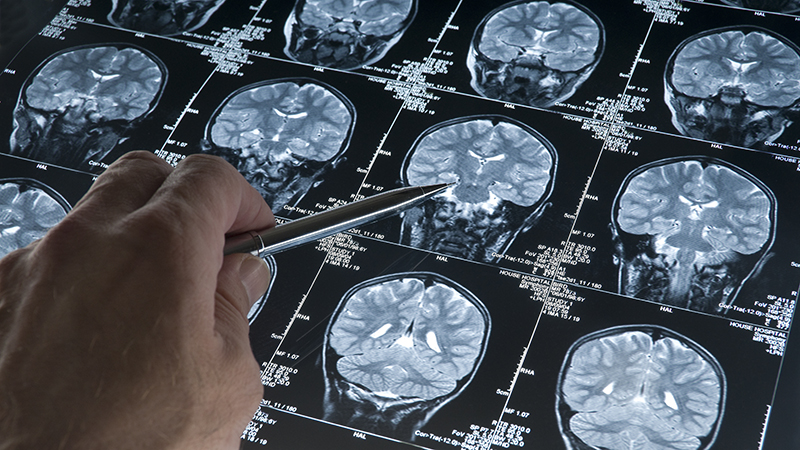Profile
Dr. Lin is a well-known expert on translational neuroimaging of brain vascular and metabolic function in aging, Alzheimer's disease (AD), stroke and traumatic brain injury (TBI). She developed and applied magnetic resonance imaging (MRI) and spectroscopy (MRS), and positron emission tomography (PET) to test nutritional and pharmacologic approaches for protecting the brain from aging, TBI and AD. She is also an expert in artificial intelligence (AI) and multi-omics (such as metabolomics and gut microbiome). She has applied AI to identify markers that are highly predictable for AD development and progression, and applied gut microbiome analyses to study gut-brain interaction underlying AD. The mission of her research program is to prevent AD by providing individualized solution with precision medicine via gut-brain axis.
Academic Information
Office
1101 Hospital Drive
NextGen Precision Health Insitutue
Columbia, MO 65211
United States
Research Interests
- Alzheimer's disease
- Traumatic brain injury
- Stroke
- Neurodegeneration
- Precision dietary and pharmacological interventions
- Gut-brain axis
Areas of Expertise
- Magnetic Resonance Imaging
- Positron emission tomography
- Metabolomics
- Gut microbiome
- Artificial Intelligence
Education & Training
Degrees
2006 PhD in Radiological Sciences, University of Texas Health Science Center at San Antonio
Awards & Honors
- 03/2016 New Vision Award, Charleston Conference on Alzheimer’s Disease
- 01/2016 Fellow, American College of Nutrition (FACN)
- 11/2015 Featured Article by the Social Media of Frontiers in Aging Neuroscience
- 09/2015 Top 15 Early Career Investigators, Charleston Conference on Alzheimer’s Disease
- 08/2015 NIH Early Career Reviewer (ECR) Program
- 05/2013 Niels Lassen Award Finalist, Brain & Brain PET 2013, Shanghai, China
- 09/2012 CTSA Mentored Research Career Development (KL2) Scholar, University of Texas Health Science Center at San Antonio, San Antonio, TX
- 05/2011 Young Investigator Bursary Award, BRAIN 2011 Meeting, Barcelona, Spain
In the News
Publications
- Yanckello LM, Hoffman JD, Chang YH, McCulloch SD, Lin, P, Lane AN, Chlipala G, Green SJ, Lin AL.
Apolipoprotein E genotype-dependent nutrigenetic effects to prebiotic inulin for reducing risk for Alzheimer’s disease via gut-brain axis.
Alzheimer's disease. Submitted to Nutritional Neuroscience. 2021. In press. - Dungan CM, Valentino T, Vechetti IJ Jr., Zdunek CJ, Bachstetter AD, Murphy MP, Lin AL, McCarthy JJ, Peterson CA.
Exercise training upregulates Dicer gene expression to modulate hippocampal miRNA expression in female 3xTg-AD mice.
J Neurophysiol. 2020; in press. doi: 10.1152/jn.00503.2020. - Hammond TC, Xing X, Wang, C, Ma D, Nho K, Crane P, Elahi F, Ziegler DA, Liang G, Cheng Q, Yanckello LM, Jacobs N, Alzheimer’s Disease Neuroimaging Initiative, Lin AL.
β-Amyloid and Tau Drive Early Alzheimer’s Disease Decline While Glucose Hypometabolism Drives Late Decline.
Commun Biol. 2020; 3:352. - Lin AL, Parikh I, Yanckello LM, White RS, Hartz AMS, Taylor CE, McCulloch SD, Thalman SW, Xia M, McCarty K, Ubele M, Head E, Hyder F, Sanganahalli BG.
APOE genotype-dependent pharmacogenetic responses to rapamycin for preventing Alzheimer's disease.
Neurobiol Dis. 2020; 139:104834. - Thalman S, Van Pelt KL, Lin AL, Johnson NF, Jicha G, Caban-Holt A, Robertson W, Lightner D, Powell D, Head E, Schmitt F.
A preliminary study of cerebral blood flow, aging and dementia in people with Down syndrome.
J Intellect Disabil Res. 2020; 64:934-945. - Van Skike CE, Lin AL, Burbank RB, Halloran JJ, Cuvillier J, Soto VY, Hussong SA, Jahrling JB, Javors MA, Hart MJ, Fischer KE, Austad SN, Galva V.
mTOR drives cerebrovascular, synaptic, and cognitive dysfunctions in normative aging.
Aging Cell 2019; e13057. doi: 10.1111/acel.13057. - Thalman SW, Powell DK, Ubele M, Norris C, Head E, Lin AL.
Brain-Blood Partition Coefficient and Cerebral Blood Flow in Canines using Calibrated Short TR Recovery (CaSTRR) Correction Method.
Front Neurosci. 2019; 13:1189. doi: 10.3389/fnins.2019.01189. - Hoffman JD, Yanckello LM, Chlipala G, Hammond TC, McCulloch SD, Parikh I, Sun S, Morganti JM, Green SJ, Lin AL.
Dietary inulin alters the gut microbiome, enhances systemic metabolism and reduces neuroinflammation in an APOE4 mouse model.
PLOS ONE. 2019; 14(8): e0221828. doi: 10.1371/journal.pone.0221828. - Braun D, Abner E, Bakshi V, Goulding D, Grau E, Lin AL, Norris C, Sudduth T, Webster S, Wilcock D, Van Eldik L.
Blood flow deficits and cerebrovascular changes in a hyperhomocysteinemia model of vascular cognitive impairment and dementia.
ASN Neuro. 2019; 11:1759091419865788. doi: 10.1177/1759091419865788. - Yanckello LM, Young LE, Hoffman JD, Mohney RP, Keaton M, Abner E, Lin AL.
Caloric Restriction Protects Brain Function in Aging by Altering Metabolic Profile and Enhances Neurotransmission at Early Age.
Front Nutr. 2019; 12;6:90. doi: 10.3389/fnut.2019.00090. - Thalman SW, Powell DK, Lin AL.
Novel Calibrated Short TR Recovery (CaSTRR) Method for Brain-Blood Partition Coefficient Correction Enhances Gray-White Matter Contrast in Blood Flow Measurements in Mice.
Front Neurosci. 2019; 13:308. doi: 10.3389/fnins.2019.00308. - Macheda T, Roberts K, Lyons DN, Higgins E, Ritter KJ, Lin AL, Alilain WJ, Bachstetter AD.
Chronic intermittent hypoxia induces robust astrogliosis in an Alzheimer's disease-relevant mouse model.
Neuroscience. 2018; doi:0.1016/j.neuroscience.2018.11.040. - Lee J, Yanckello LM, Parikh I, Hoffman JD, Thalman S, Bauer B, Hartz AMS, Hyder F, Lin AL.
Neuroimaging Biomarkers of mTOR Effects on Vascular and Metabolic Functions in Aging Brain and Alzheimer’s disease.
Front Aging Neurosci. 2018; 10:225. doi: 10.3389/fnagi.2018.00225. - Lyons D, Vekaria H, Macheda T, Bakshi V, Powell D, Gold B, Lin AL, Sullivan P, Bachstetter A.
A mild traumatic brain injury in mice produces lasting deficits in brain metabolism.
J. Neurotrauma. 2018; 35:2435-2447. - Ma D, Wang A, Parikh I, Hoffman JD, Green SJ, Chlipala G, Murphy MP, Sokola BS, Bauer B, Hartz AMS, Lin AL.
Ketogenic Diet Enhances Neurovascular Function with Altered gut Microbiome in Young Healthy Mice.
Sci Rep. 2018; 8: 6670. A Top 100 article in 2018 of the Scientific Reports. - Jahrling J, Lin AL, DeRosa N, Hussong S, Van Skike C, Girotti M, Javors M, Zhao Q, Maslin LA, Asmis R, Galvan V.
mTOR Drives Cerebral Blood Flow and Memory Deficits in LDLR-/- Mice Modeling Atherosclerosis and Vascular Cognitive Impairment.
J Cereb Blood Flow Metab. 2018; 38:58-74.



